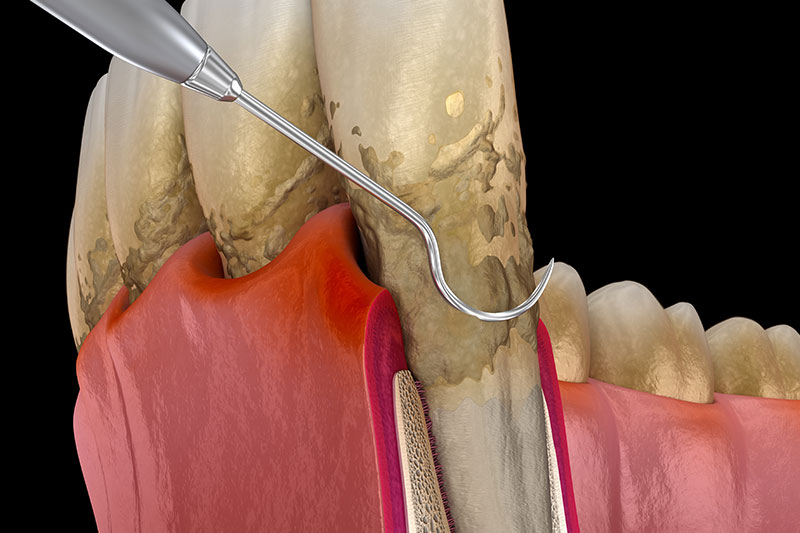Gum Periodontal Disease in Madison

Helping to keep your mouth healthy by avoiding Periodontal Disease
Periodontal diseases are infections of the gums, which gradually destroy the support of your natural teeth. There are numerous disease entities requiring different treatment approaches. Dental plaque is the primary cause of gum disease in genetically susceptible individuals. Daily brushing and flossing will prevent most periodontal conditions.
Why is Managing Periodontal Disease Important
Adults over 35 lose more teeth to gum (periodontal) disease than from cavities, three out of four adults are affected at some time in their life. The best way to prevent cavities and periodontal disease is by good tooth brushing and flossing techniques, performed daily and regular hygiene maintenance visits. Periodontal disease can be accelerated by a number of different factors. However, it is mainly caused by the bacteria found in dental plaque.
Preventing Periodontal Disease
The best way to prevent gum disease is effective daily brushing and flossing as well as regular professional examinations. Unfortunately, even with the most diligent home dental care, people can still develop some form of periodontal disease. Once this disease starts, professional intervention is necessary to prevent it’s progress.
Periodontal Disease treatments
The periodontal pockets around the tooth are cleaned and all root surfaces are smoothed. In the majority of early gum disease cases, treatment entails improved home care techniques, Arestin and scaling and root planing. Advanced cases may require surgical treatment.
Periodontal Maintenance FAQ
Thorough removal of plaque by flossing, brushing and regular professional cleanings will minimize your risk of gum disease. However, there are other factors that can affect the health of your gums, such as stress, diabetes, genetics and pregnancy.
Gingivitis is an infection within the gums caused by bacteria found in plaque. A diabetic’s body doesn’t respond as quickly to infection treatment as a non-diabetic. If the infection persists, it can spread to the underlying bone that supports and anchors the teeth.
It has been shown that diabetics who keep their condition under control and maintain good oral hygiene have a far better chance of combating infections than those who are poorly controlled.
In the earlier states of gum disease (mild to moderate periodontitis), most treatment involves scaling and root planning. The procedure aims at removing plaque and calculus from the surface of the tooth adjacent to gum tissue.
The periodontal pockets around the tooth are cleaned and all root surfaces are smoothed. In the majority of early gum disease cases, treatment entails improved home care techniques, Arestin and scaling and root planning. Advanced cases may require surgical treatment.

